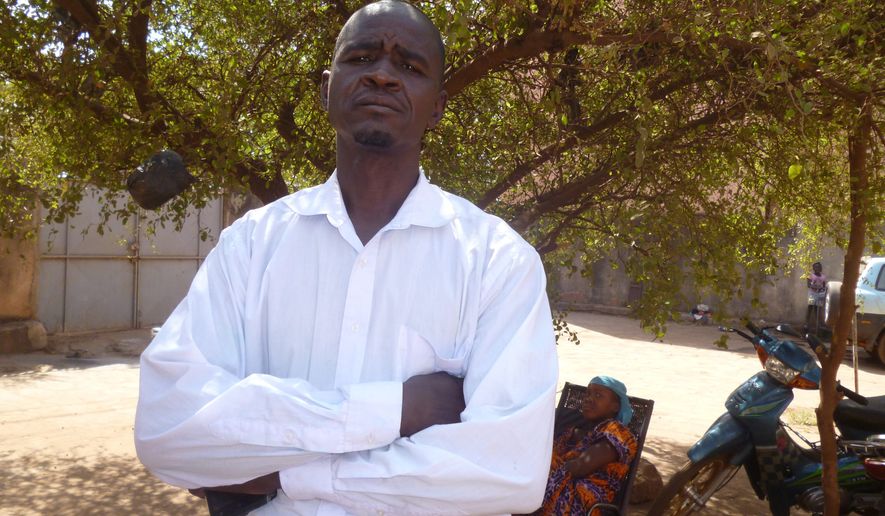BAMAKO, Mali — Hamey Coulibaly’s neighbors threatened to kill him when he publicly renounced his slave status in September, forcing the father of seven to flee his home in Troukoumbe, a village in the southwestern part of Mali. He now lives in hiding in the West African country’s capital.
“How long this suffering will continue?” he said. “I’m worried about the future, about my relatives living in humiliation in my village because I decided to stand against slavery. Only God can help us.”
It seems inconceivable in the 21st century, but Mr. Coulibaly is one of the hundreds of thousands of slaves — the exact number is in sharp dispute — in Mali, living mostly in the country’s southwestern and northern regions. He is a member of the Bambara minority, one of the groups whose members often live in effective lifelong servitude under ethnic Soninke masters. In the north, the Touareg tend to own members of the minority Bella community.
Living under an institution that dates back at least 10 centuries, Malian slaves can’t run for elected office or marry non-slaves and must labor as domestics. “You don’t have the right to be an imam and lead prayers in the mosques, even if you are the most educated in Islamic culture,” said Mr. Coulibaly, who also left his two wives back home.
Technically illegal, the institution of slavery is hereditary in Mali. Its persistence and the violence against those caught trying to escape servitude reflect the deep-seated roots of the practice, said Idrissa Aklinine, an analyst for the Bamako-based National Coalition of Civil Society, a human rights activist group.
But as experiences of the U.S. and a range of other Western nations show, the practice of slavery can change.
“What’s happening now to slave descendants in Soninke communities must outrage every Malian,” said Mr. Aklinine. “President Ibrahim Boubacar Keita needs to hear from those who denounce slavery. Then he can order his services to investigate the allegations of anti-slavery movements.”
In November, Malian slaves’ hope rose when the Trump administration suspended aid to Mauritania under the African Growth and Opportunity Act, citing the country’s lack of progress in combating slavery.
“We need strong actions, like what the Trump administration did in Mauritania,” said Mr. Aklinine. “World leaders must join with America.”
But officials defended the government’s caution on reforms, arguing that the country is focused on fighting an Islamist insurgency and armed groups of Touareg separatists and does not have the time or resources to tackle the slavery question right now.
“People must understand that the government and the Ministry of Justice are aware of the necessity to pass a law criminalizing slavery,” said Boubacar Traore, a staff member of the Justice Ministry. “The delay, in my viewpoint, may be due to the country’s insecurity and its political instability, which [have been] challenging authorities for several years.”
Dangerous campaign
Mr. Coulibaly’s troubles started last summer when he joined the local chapter of Gambana, a European anti-slavery movement that operates in Mali, Gambia, Mauritania and other West African countries. In September, he traveled with Gambana activists, declaring that they had sloughed off the yoke of slavery while drawing attention to the harsh life they endured.
When he returned home, his neighbors — both masters and slaves who supported traditional bondage arrangements — were angry.
Vandals destroyed his home and held his 80-year-old mother hostage for a day while forcing his brother to pull goat skin — a menial job in Mali that is reserved for slaves. The family suffered another blow when its peanut farm failed because of the local hostility.
“I can’t understand why we are going through all these abuses,” Mr. Coulibaly said. “It seems we are not citizens of the same country.”
The complications are particularly evident in northern Mali, where activists are protesting slavery and where armed separatists have been fighting the central government for more than seven years.
Abdoulaye Mako, the vice president of Temedt, an anti-slavery association based in northern Mali, acknowledged the tense situation and said violence is common in dozens of villages in the region’s southwest.
Mr. Mako’s association decided to sue the ringleaders of mobs who had organized violence against Mr. Coulibaly, his family and other villagers in the region where anti-slavery campaigners have been active. He and other Temedt activists went to Mr. Coulibaly’s village and read the Universal Declaration of Human Rights in the public square.
The demonstration sparked a riot as locals attacked them with machetes and clubs.
“They didn’t want to hear that people are born equal,” said Mr. Mako. “Suddenly, there were murmurs and some started to [batter] slave descendants around them. There was blood everywhere.”
The lawsuit helped lead to the arrest of a man in Bamako who posted an internet video calling for the deaths of anti-slavery campaigners. None of the Troukoumbe villagers has been arrested.
Mr. Coulibaly recently heard that a crowd of slave supporters tied up his Gambana colleague Lassa Coulibaly in Kerwane and dragged him on the ground. The colleague survived but suffered serious injuries.
Hamey Coulibaly said he fears what would happen if his masters find him in Bamako.
“If they know that I’m living in this place, they will kill me,” he said.




Please read our comment policy before commenting.